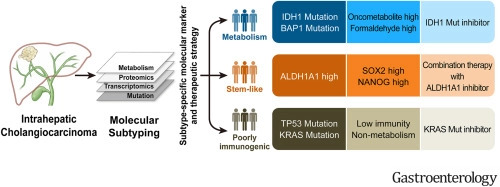Researchers at the National Cancer Center (NCC) have identified new bile duct cancer subtypes by analyzing proteogenomic data to reveal new therapeutic targets for intractable intrahepatic bile duct cancer, the hospital said.

Protein genome research is in the spotlight as a research method that can overcome the limitations of existing cancer treatments, by analyzing genomic, transcriptomic, proteomic, and phosphoproteomic data.
Biliary tract cancer forms in the cells of the bile ducts, gallbladder, or ampulla of Vater and is classified depending on which part of the bile duct that cancer develops. It is rare worldwide, but in Korea, it is relatively common, and difficult to diagnose early, and the prognosis is not good.
Accordingly, the research team conducted a protein genome study on 102 intrahepatic bile duct cancer tissues and verified the treatment method through a tumor organoid model.
Specifically, the research team identified three subtypes of biliary duct cancer including stem-like, poorly immunogenic, and metabolic subtypes. In stem-like subtypes, it was confirmed that the ALDH1A1 inhibitor reacted with nab-paclitaxel to increase the inhibitory action. In addition, it was verified that abnormal expression of tumor metabolites in stem-like and metabolic subtypes was associated with the survival period.
In particular, in the case of low immunogenic subtypes, it was confirmed that tumor infiltration of T cells was low compared to other subtypes. This integrated multiomics analysis reproduced three types while showing tumor heterogeneity of intrahepatic biliary tract cancer.
"The proteomic big data produced will be accessible by the public in cooperation with the international consortium of protein genomes and it is expected to be used for machine learning research development for bio-big data analysis," said Dr. Jin-young Kim of the Korea Basic Science Institute.
“This large-scale protein genome analysis provides information beyond genetic analysis and allows us to distinguish the functional effects of genetic variation," said Professor Woo Sang-myung of NCC. "This study will help us classify patients with intrahepatic bile duct cancer according to subtypes and develop patient-specific treatments."
The study was published in the latest issue of the Gastroenterology journal.
Related articles
- Yonsei researchers find novel drug candidate to treat clinically refractory cancers
- ‘Keytruda’s successful clinical trial is good news for stage 4 gastric cancer patients’
- Cancer patients can have better prognosis if they increase muscle mass: study
- GC Genome's algorithm shows increased cancer diagnosis rate in liquid biopsies

